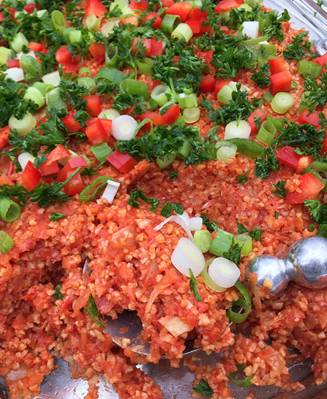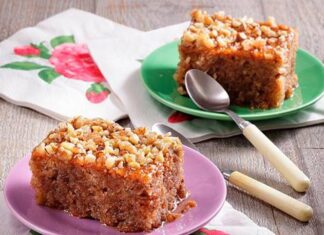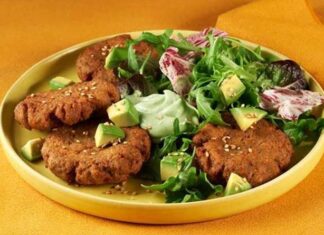A “meaty” vegan salad that can be a delicious part of a larger spread or a satisfying one-dish meal.
“The Mediterranean diet, a meal plan that emphasizes fresh produce, whole grains, fish, and healthy fats has proven to not only prevent diseases such heart disease and cancer, but those who eat this way are also at a decreased risk for depression, dementia, and weight gain. My mom is Armenian, so I was raised on this style of eating, and as it turns out, many of my childhood favorite dishes are naturally vegan, including this holiday favorite, eetch,” says Ellen Whitney, a Certified Personal Trainer and Fitness Nutrition Specialist.
“Eetch (otherwise known as eech, itch, metch or one of several other variations) is a cooked grain salad made with bulgur, roasted red pepper, tomatoes and onions. I was introduced to this recipe while visiting my Armenian relatives in Philadelphia for Easter, and at first bite I thought I was eating meat because it had such a rich flavor,” says Ellen. “Now that I don’t eat meat, and remembering my first impression, I love serving it to my meat-eating friends, and throwing in the ‘it’s vegan’ after they’ve raved about how much they love it in my mission to prove Health Tastes Good. My aim is to show that food that is healthy, nourishes the body, and gives it strength can continue to bring friends and family together to make lasting memories. Eetch is often served as part of an appetizer (meze) spread at gatherings, but it also makes a satisfying, easy-to-assemble one-dish meal. While this recipe is excellent served year-round, it’s extra special in the heat and height of summer, when cold dishes are welcome and vibrant fresh herbs, lettuces, and juicy, flavorful tomatoes abound.”

“It’s better to think of eetch as a meatless meat dish. Traditionally, Armenians were known for being pious and carnivorous in equal measure, and with some 160 fast days scattered throughout the Armenian Church calendar year (including the 40 days of Lent), they faced near-constant roadblocks to enjoying meat. Which means that Armenians have made vegetarian and vegan cooking something of an art form, and eetch is one of our greatest creations,” says baking teacher, recipe developer, and writer Andrew Janjigian in Serious Eats. “In eetch, the meat is left out. The meatiness and moisture of the dish is instead provided by additional tomato in various forms-paste, canned, and/or fresh-and the fat comes in the form of olive or vegetable oil. While it can be eaten with a fork, it’s more often consumed wrapped with a tender lettuce leaf or a shroud of lavash. And eetch is a perfect Lenten recipe.”*
“Bulgur, the main ingredient in eetch, pleasantly surprised the first time I learned its nutritional breakdown-thinking since it was such a complex grain it would be very caloric, yet it actually contains less calories per cup than white rice, brown rice, and quinoa, adds Ellen. “Just 1 cup of cooked bulgur is approximately 151 calories, .5g fat, 34g carbs (8g fiber, 26g net), and 6g protein. Bulgur’s most dense nutrient is manganese, packing over 50% of your daily need per cup, which is great for skin health (because it helps produce collagen), bone health, and helps stabilize blood sugar. Another bonus for me is it provides 15% of my daily magnesium and 10% of iron, two minerals I always have to consciously consume since I’m so active and don’t eat meat.”
“In August 2015, I adopted a plant-based diet. So many of the recipes on this site will be vegan, however, I’m also a personal chef and recognize that not everyone eats this way, so recipes including organic meats will sometimes make an appearance as well. In addition to food and nutrition, my other passion is fitness. My favorite way to start each day is with movement. Officially, I am a Certified Personal Trainer and Fitness Nutrition Specialist through the National Academy of Sports Medicine (NASM); I have my 300-hour Modo yoga teacher certification, and have a marketing degree from the University of Georgia,” says Ellen.









